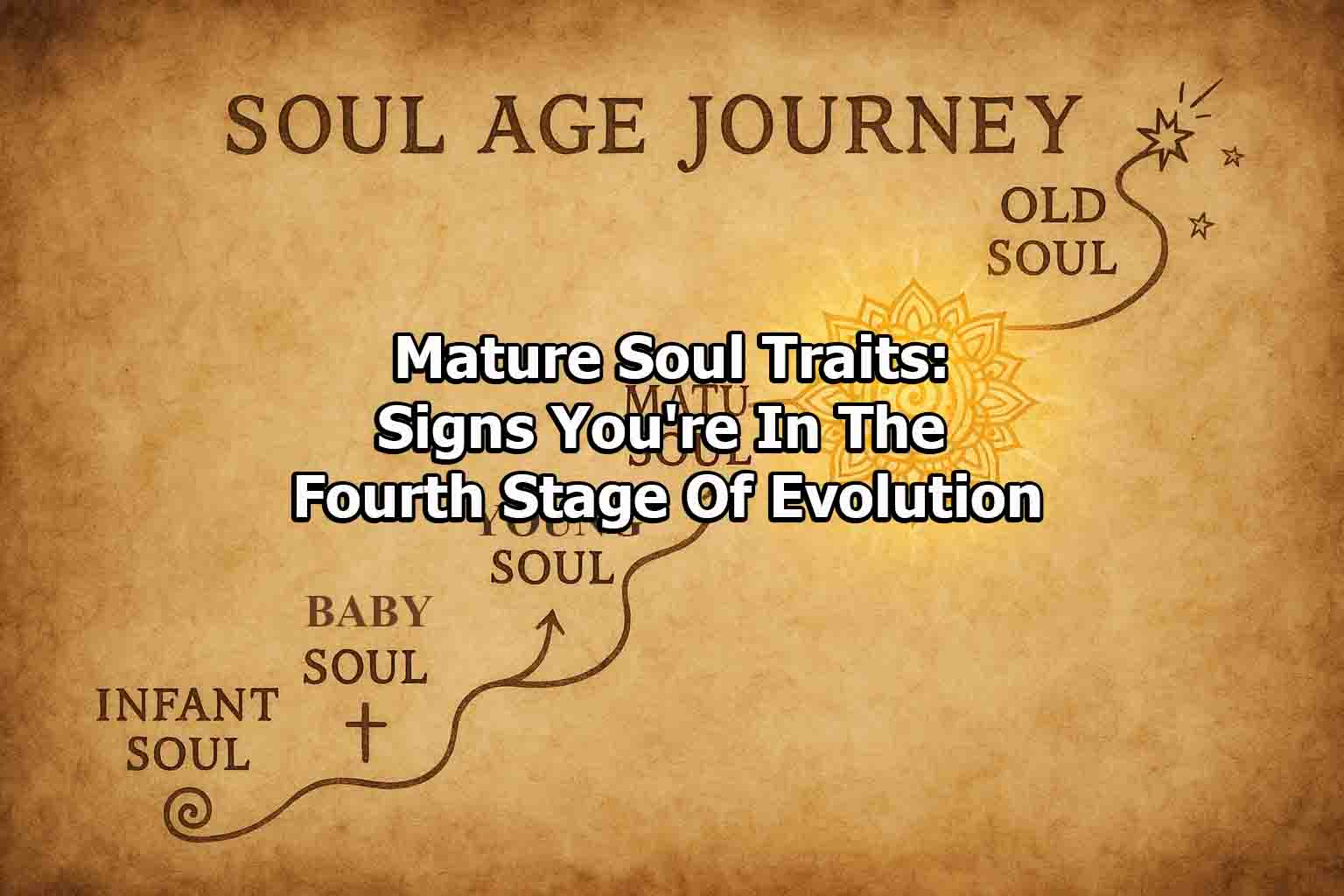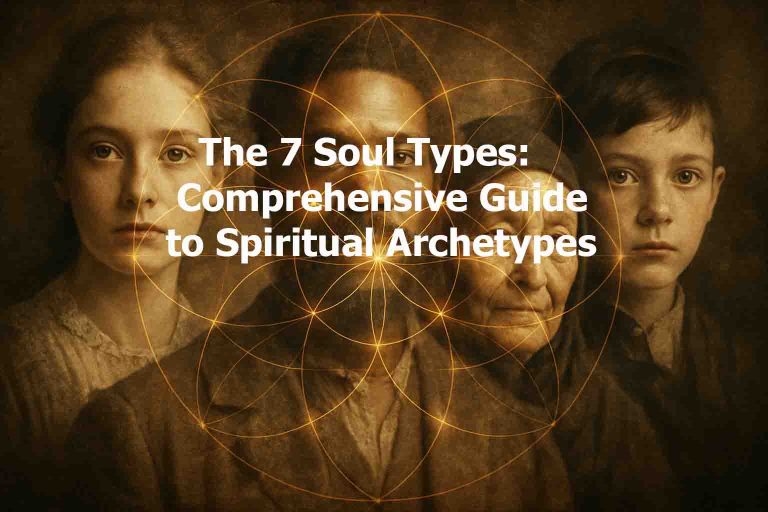Mature Soul Traits: Signs You’re In The Fourth Stage Of Evolution
Discover the profound characteristics of mature soul consciousness, where spiritual evolution shifts from external achievement to emotional depth, authentic relationships, and psychological understanding for transformative growth.
The mature soul stage represents a profound shift in spiritual evolution, marking the transition from external achievement focus to internal exploration, emotional depth, and authentic relationship. Understanding mature soul traits provides insight into this transformative developmental phase where consciousness turns inward to explore the complexities of emotion, psychology, and genuine human connection.
Mature souls comprise approximately 30% of Earth’s current population, with their numbers increasing as more souls complete young soul lessons about material mastery and advance to emotional and psychological development. Their growing influence shapes contemporary culture toward greater authenticity, emotional intelligence, and relationship depth.
Unlike the achievement-oriented young soul stage, mature souls concentrate on developing emotional wisdom, creating authentic relationships, exploring psychological patterns, and expressing their true selves regardless of external expectations. This fundamental shift often creates initial discomfort as souls adjust to prioritizing internal authenticity over external success.
The mature soul stage typically spans numerous lifetimes as souls learn to navigate emotional complexity, develop authentic relationships, understand psychological dynamics, and balance individual authenticity with genuine connection to others. This developmental process creates the foundation for subsequent wisdom integration at the old soul stage.
Understanding mature soul traits helps explain many contemporary phenomena, from the growth of therapy and personal development to increasing emphasis on emotional intelligence and authentic communication. Rather than viewing these characteristics as weaknesses compared to young soul achievement drive, recognizing their evolutionary purpose cultivates appreciation for this essential developmental stage.
This comprehensive exploration will guide you through the distinctive characteristics of mature soul consciousness, helping you recognize these traits in yourself and others while understanding their gifts, challenges, and role in spiritual evolution. Whether you identify with mature soul energy or interact with mature souls regularly, this framework provides valuable insight for navigating these deep and meaningful relationships.
Table of Contents
The Mature Soul in Spiritual Evolution
The mature soul stage occupies the fourth position in the seven-stage spiritual evolution framework, representing a crucial transition from external achievement to internal exploration. Mature souls have typically completed young soul lessons about material mastery and individual power, now focusing on emotional depth, psychological understanding, and authentic relationship creation.

This evolutionary position explains much about mature soul behavior and priorities. Having developed confidence and material capability during the young soul stage, mature souls now concentrate on understanding emotional patterns, creating genuine connections, and exploring authentic self-expression beyond external expectations and social conditioning.
The developmental purpose of the mature soul stage involves developing emotional intelligence and psychological awareness, creating authentic relationships based on genuine connection, exploring personal identity beyond social roles and expectations, understanding complex emotional and interpersonal dynamics, and learning to balance individual authenticity with meaningful connection to others.
Mature souls typically incarnate in environments that support emotional and psychological exploration, including cultures that value authenticity and self-expression, communities with access to therapeutic and healing resources, artistic and creative environments that encourage depth, and relationships that provide opportunities for emotional growth and authentic intimacy.
The average duration of the mature soul stage spans numerous lifetimes as souls work to master emotional wisdom, develop authentic relating skills, and integrate psychological understanding. Some souls advance through this stage relatively quickly, while others require extensive experience to master emotional complexity before progressing to old soul wisdom integration.
Current estimates suggest mature souls comprise approximately 30% of Earth’s population, with numbers increasing as young souls complete achievement-oriented lessons and advance to emotional development. This growing demographic influences contemporary culture toward greater emphasis on authenticity, emotional intelligence, and relationship depth.
The shift from external to internal focus represents the most significant aspect of mature soul development. After lifetimes of achievement and material mastery, the turn toward emotional depth and psychological understanding can initially feel disorienting as external validation becomes less satisfying than authentic self-expression.
The rising influence of mature soul values in contemporary society manifests through increased interest in therapy and personal development, emphasis on emotional intelligence in education and business, cultural movements toward authenticity and inclusion, artistic expression that explores emotional and psychological depths, and relationship approaches that prioritize genuine connection over convenience or status.
For comprehensive understanding of mature soul placement within complete spiritual development, see our detailed guide to Spiritual Evolution Stages: The 7 Levels of Soul Development, which provides context for mature soul characteristics within the broader framework of consciousness evolution.
Mature Soul Trait #1: Emotional Sensitivity
The heightened awareness of emotional states, both personal and interpersonal, represents perhaps the most fundamental mature soul characteristic. This emotional sensitivity provides the foundation for all other mature soul developments while creating both gifts and challenges in navigating daily life.

Mature soul emotional awareness manifests through acute sensitivity to emotional atmospheres and interpersonal dynamics, ability to perceive subtle emotional shifts in themselves and others, strong reactions to emotional stimuli including art, music, and human stories, natural empathic abilities that sense others’ emotional states, intense processing of emotional experiences and relationships, and difficulty functioning in emotionally harsh or inauthentic environments.
The positive aspects of emotional sensitivity include development of profound empathy and compassion, natural therapeutic and healing abilities, appreciation for emotional depth in art and relationships, authentic communication that addresses real emotional needs, capacity for genuine intimacy and emotional connection, and contribution to emotional healing and growth in communities.
How emotional intelligence develops at this stage includes learning to distinguish between personal and projected emotions, developing vocabulary and frameworks for understanding emotional complexity, practicing healthy emotional expression and communication, creating boundaries that protect sensitivity while maintaining openness, and integrating emotional awareness with rational thinking and practical action.
The challenges of increased sensitivity often include emotional overwhelm in difficult situations, difficulty with conflict and confrontation, tendency to absorb others’ emotional states unconsciously, vulnerability to emotional manipulation or abuse, and struggle to function in achievement-oriented environments that dismiss emotional considerations.
The evolutionary purpose of emotional depth involves developing wisdom about human psychology and motivation, creating healing capacities that serve individual and collective growth, modeling authentic emotional expression for others, and preparing for old soul integration that requires emotional wisdom alongside spiritual understanding.
Tools for managing enhanced emotional awareness include meditation and mindfulness practices that create space between emotions and reactions, therapy and counseling that provide frameworks for understanding emotional patterns, creative expression that processes emotional experiences, energy protection techniques that maintain boundaries, and community with others who understand and appreciate emotional depth.
Recognition of emotional sensitivity includes observing strong reactions to emotional stimuli, natural empathy and concern for others’ wellbeing, preference for authentic emotional expression over superficial interaction, ability to sense emotional atmospheres and dynamics, and challenges functioning in emotionally harsh environments.
Mature Soul Trait #2: Psychological Self-Awareness
The intense focus on understanding inner dynamics, motivations, and psychological patterns represents a defining characteristic of mature soul consciousness. This psychological awareness drives much mature soul behavior while creating opportunities for profound personal transformation and healing.

Mature soul psychological exploration manifests through fascination with understanding personal motivations and behavioral patterns, analysis of relationship dynamics and interpersonal psychology, exploration of childhood influences and family patterns, interest in therapeutic modalities and personal growth work, examination of belief systems and their psychological origins, and integration of psychological insights into daily life and relationships.
The positive aspects of psychological self-awareness include development of genuine self-knowledge and authentic identity, ability to heal psychological wounds and trauma patterns, understanding of human motivation that improves relationships, capacity for conscious behavior change and growth, modeling of psychological maturity for others, and contribution to collective understanding of human psychology.
How psychological insight transforms relationships includes ability to communicate about emotional needs and patterns honestly, understanding of projection and transference in relationship dynamics, capacity for taking responsibility for personal patterns without blame, skill in navigating conflict through psychological awareness, development of genuine intimacy through authentic self-revelation, and healing of relationship patterns inherited from family and culture.
The mature soul’s journey through shadow work involves confronting and integrating rejected aspects of personality, healing psychological wounds and trauma from current and past experiences, recognizing and transforming limiting beliefs and patterns, developing compassion for all aspects of human psychology, and achieving greater wholeness through psychological integration.
The evolution of self-reflection capabilities includes progression from external blame to internal responsibility, development from superficial analysis to deep psychological understanding, movement from theoretical knowledge to experiential integration, advancement from individual focus to relational awareness, and growth from psychological insight to spiritual wisdom.
However, psychological self-awareness can become excessive when analysis replaces action and experience, when self-focus prevents attention to others’ needs, when psychological understanding becomes intellectual defense against genuine feeling, when constant processing overwhelms simple enjoyment of life, or when therapeutic focus prevents engagement with practical responsibilities.
Famous examples of psychological self-exploration include therapeutic pioneers who developed healing modalities, artists whose work explores psychological depths, writers who examine human motivation and psychology, and spiritual teachers who integrate psychological and spiritual understanding.
The evolutionary purpose of psychological awareness teaches mature souls essential lessons about human motivation and healing, provides tools for conscious behavior change and growth, develops empathy and understanding that serves others, and creates foundation for old soul wisdom that integrates psychological understanding with spiritual perspective.
Mature Soul Trait #3: Authenticity Seeking
The powerful drive toward genuine self-expression and rejection of artificial social conditioning represents a central aspect of mature soul development. This authenticity seeking transforms how mature souls approach relationships, career, and personal expression while often creating initial conflict with social expectations.

Mature soul authenticity drive manifests through discomfort with superficial social interactions and roles, rejection of career or lifestyle choices that conflict with personal values, insistence on honest communication even when socially challenging, exploration of personal identity beyond conventional categories, expression of genuine emotions and opinions regardless of social approval, and creation of lifestyle and relationships that reflect authentic preferences.
The positive aspects of authenticity seeking include development of genuine self-knowledge and confident self-expression, creation of relationships based on real connection rather than convenience, modeling of authentic living that inspires others, contribution to social evolution toward greater acceptance of diversity, healing of shame and conditioning that prevents genuine expression, and achievement of deep satisfaction through alignment with personal truth.
How authenticity transforms personal relationships includes movement from role-based to genuine person-to-person connection, communication that addresses real feelings and needs rather than social expectations, conflict that serves relationship depth rather than avoiding authentic discussion, intimacy based on mutual understanding and acceptance, and healing of relationship patterns based on performance and approval-seeking.
The challenge of vulnerability and transparency involves learning to express genuine feelings and needs despite potential rejection, developing courage to be seen authentically rather than through protective personas, creating boundaries that maintain authenticity without becoming defensively closed, balancing honesty with compassion for others’ sensitivity, and finding communities that appreciate and support authentic expression.
Cultural expressions of authentic living include artistic movements that challenge conventional expression, social movements that advocate for authentic identity acceptance, therapeutic approaches that emphasize genuine self-expression, spiritual communities that encourage authentic spiritual exploration, and business cultures that value employee authenticity alongside professional competence.
The contrast with young soul characteristics of image consciousness creates significant differences in values and priorities. While young souls focus on effective presentation for achievement goals, mature souls prioritize authentic expression even when it conflicts with social expectations or professional advancement opportunities.
Balancing authenticity with social cooperation involves maintaining genuine self-expression while considering impact on others, communicating authentically with compassion and skill, choosing appropriate contexts for different levels of authentic sharing, developing patience with others who operate from different values, and finding ways to serve others while maintaining personal integrity.
The evolutionary purpose of authenticity seeking teaches mature souls essential lessons about genuine self-expression and identity, creates healing from social conditioning and shame, develops courage and integrity that serves spiritual growth, and models authentic living that supports collective evolution toward greater acceptance and inclusion.
⭐ DISCOVER YOUR COMPLETE TRI-DIMENSIONAL BLUEPRINT ⭐
Branch out with our ‘Weekly Wisdom from the Tree’ newsletter, then unlock your personalized 15+ page analysis revealing how all three pathways integrate as YOUR unique combination type:
🔮 Your Enneagram Type – How you move through the world
🌟 Your Soul Type – Why you’re here and your spiritual purpose
⚡ Your Healing Pathway – Your natural healing gifts and energetic sensitivities
No more exploring in fragments. Get your complete roadmap – one of 189 unique combinations – showing exactly how your personality patterns, soul purpose, and healing gifts work together to create the real you.
Mature Soul Trait #4: Complex Relationship Focus
The central importance of deep, meaningful connections characterizes mature soul consciousness more than any other trait. This relationship focus drives much mature soul behavior while creating both profound satisfaction and significant challenges in navigating interpersonal dynamics.

Mature soul relationship emphasis manifests through prioritizing emotional connection over practical convenience in partnerships, seeking friends and partners who appreciate depth and authenticity, investing significant time and energy in understanding relationship dynamics, creating relationships that support mutual growth and healing, exploring various relationship styles and approaches, and experiencing relationships as primary venues for personal development.
The positive aspects of complex relationship focus include development of genuine intimacy and emotional connection skills, creation of supportive communities that appreciate depth and authenticity, healing of relationship wounds through conscious relational work, modeling of healthy relationship dynamics for others, contribution to collective understanding of authentic relating, and achievement of deep satisfaction through meaningful human connection.
How relationship dynamics drive mature soul growth includes learning about personal patterns through relationship mirrors, developing communication skills that serve authentic connection, healing childhood and family relationship wounds, exploring different types of intimate and friendship connections, understanding projection and transference in relationship dynamics, and practicing vulnerability and trust in intimate settings.
The evolution beyond transactional relationships involves movement from relationships based on mutual utility to connections based on genuine appreciation, progression from superficial interaction to emotional and psychological depth, development from role-based relating to person-to-person authentic connection, advancement from independent functioning to interdependent mutual support, and growth from conflict avoidance to conscious conflict resolution.
Navigating intensity and boundaries becomes a crucial mature soul skill involving learning to maintain individual identity within intimate connections, developing communication that addresses relationship issues constructively, creating space for individual growth within relationship contexts, balancing emotional availability with necessary self-protection, and understanding the difference between healthy interdependence and codependent fusion.
The approach to relationship as spiritual practice includes using relationship challenges as opportunities for personal growth, practicing forgiveness and compassion in difficult relationship dynamics, developing patience and understanding with others’ psychological patterns, learning to love others authentically without trying to change them, and recognizing relationship interactions as venues for developing emotional and spiritual wisdom.
However, relationship focus can become problematic when personal identity becomes entirely dependent on relationship status, when relationship processing overwhelms simple enjoyment of connection, when emotional intensity prevents practical life functioning, when relationship needs become demands that burden others, or when relationship focus prevents individual development and self-responsibility.
The evolutionary purpose of relationship consciousness teaches mature souls essential lessons about authentic connection and emotional intimacy, develops healing capacities that serve individual and collective growth, creates understanding of human psychology through relationship dynamics, and provides foundation for old soul service that requires deep understanding of human nature and emotional wisdom.
Mature Soul Trait #5: Ethical Complexity
The movement beyond simple right-and-wrong thinking toward nuanced moral reasoning represents a significant mature soul development. This ethical sophistication creates both wisdom and uncertainty as mature souls navigate complex moral territories without clear guidelines.

Mature soul ethical development manifests through recognition that most situations involve multiple valid perspectives, consideration of context and motivation in moral reasoning, discomfort with absolute moral pronouncements and rigid rules, exploration of personal values that may conflict with cultural expectations, difficulty making quick moral judgments without extensive consideration, and development of situational ethics that consider individual circumstances.
The positive aspects of ethical complexity include development of compassion and understanding for different perspectives, ability to navigate complex moral situations with wisdom, tolerance for ambiguity and uncertainty in ethical decision-making, creation of personal value systems based on experience rather than external authority, modeling of thoughtful ethical reasoning for others, and contribution to social evolution toward more sophisticated moral understanding.
How ethical nuance develops at this stage includes questioning inherited moral beliefs and cultural conditioning, examining the psychological and social origins of ethical systems, developing personal moral reasoning through life experience, learning to balance competing values and priorities, understanding how context affects moral choices, and integrating emotional wisdom with ethical thinking.
The mature soul’s struggle with moral ambiguity often involves anxiety about making “wrong” choices without clear guidelines, difficulty functioning in systems that require absolute moral positions, confusion when personal values conflict with social or professional expectations, analysis paralysis when facing complex ethical decisions, and loneliness when others cannot understand nuanced moral reasoning.
Evolving beyond rigid rule systems includes recognition that moral rules serve specific cultural and historical contexts, understanding that ethical development requires personal responsibility rather than external authority, appreciation for the wisdom in various ethical systems without absolute adherence, development of flexible moral reasoning that considers multiple factors, and integration of rational and emotional aspects of ethical decision-making.
Examples of mature ethical thinking include social justice approaches that consider systemic and individual factors, environmental ethics that balance human needs with ecological preservation, relationship ethics that honor both individual authenticity and partner consideration, professional ethics that balance personal integrity with organizational responsibilities, and parenting approaches that adapt to individual children’s needs while maintaining consistent values.
The evolutionary purpose of ethical complexity teaches mature souls important lessons about moral reasoning and personal responsibility, develops wisdom that serves complex moral navigation, creates understanding of human motivation in ethical choices, and prepares for old soul integration that requires sophisticated ethical wisdom for spiritual service.
Recognition of ethical complexity includes observing difficulty with absolute moral positions, consideration of context and motivation in ethical reasoning, discomfort with rigid moral rules and systems, development of personal ethics through experience, and appreciation for multiple perspectives in moral discussions.
Mature Soul Trait #6: Empathic Connection
The expanded capacity to feel and understand others’ emotional experiences represents one of the most distinctive mature soul characteristics. This empathic ability creates both profound gifts for healing and service while requiring careful management to prevent emotional overwhelm.

Mature soul empathy manifests through natural ability to sense others’ emotional states and needs, strong emotional responses to others’ pain and suffering, intuitive understanding of interpersonal dynamics and motivations, ability to provide comfort and support during emotional difficulties, attraction to healing and helping professions, and difficulty maintaining emotional boundaries in challenging interpersonal situations.
The positive aspects of empathic connection include development of natural therapeutic and healing abilities, creation of safe spaces for others’ emotional expression and growth, contribution to emotional healing in families and communities, modeling of emotional intelligence and compassion, ability to bridge understanding between different people and perspectives, and provision of emotional support that serves others’ development.
How empathy transforms worldview and priorities includes recognition of the interconnectedness of all human experience, development of global awareness and concern for collective welfare, prioritization of emotional wellbeing alongside material considerations, understanding of how personal actions affect others emotionally, motivation to serve healing and growth rather than purely personal advancement, and evolution of values toward compassion and service.
The challenges of empathic overwhelm often include difficulty distinguishing between personal and others’ emotions, exhaustion from absorbing negative emotional atmospheres, tendency to take responsibility for others’ emotional states, vulnerability to emotional manipulation and energy drainage, and struggle to maintain personal needs and boundaries in helping relationships.
The evolutionary purpose of increased empathy involves developing wisdom about human psychology and emotional needs, creating healing capacities that serve individual and collective growth, modeling compassion and understanding for others, preparing for service-oriented stages of development, and contributing to collective emotional intelligence and wisdom.
Developing healthy empathic boundaries includes learning to sense others’ emotions without absorbing them, creating protection practices that maintain empathic ability while preserving personal energy, distinguishing between helpful empathy and codependent enabling, developing self-care practices that support empathic sensitivity, and understanding when empathy serves others versus when it becomes burdensome.
The contribution to collective emotional intelligence includes modeling healthy emotional expression and communication, creating understanding and bridge-building between different groups, providing emotional support and healing in communities, advancing therapeutic and healing modalities, and contributing to cultural evolution toward greater emotional wisdom and compassion.
Recognition of empathic connection includes observing natural ability to sense others’ emotional states, strong emotional responses to others’ experiences, tendency to provide emotional support and comfort, attraction to healing and helping activities, and challenges maintaining emotional boundaries in difficult situations.
The Heart’s Journey: Healing Through Emotional Wisdom”
“Embark on a profound journey of emotional healing designed specifically for mature souls ready to transform their sensitivity into wisdom and their emotional depth into spiritual strength. This powerful meditation helps you navigate the intense emotional landscape of mature soul consciousness while developing the skills to use your emotional gifts for healing rather than suffering.”
⭐ THE KNOWING TREE JOURNEY: ROOTS & BRANCHES OF SELF ⭐ “Branch out with our ‘Weekly Wisdom from the Tree’ newsletter. Then discover your personalized 15+ page analysis revealing both your Enneagram foundation and Soul Type canopy, mapping your complete Knowing Tree Journey.”
Mature Soul Trait #7: Identity Questioning
The deep exploration of authentic selfhood beyond social roles and expectations represents a fundamental aspect of mature soul development. This identity questioning drives much mature soul behavior while creating both liberation and uncertainty as conventional identity markers become insufficient.

Mature soul identity exploration manifests through questioning career choices and professional identity, examining relationship roles and expectations, exploring personal values versus cultural conditioning, experimenting with different lifestyle approaches and expressions, seeking authentic self-expression beyond social approval, and experiencing identity crisis periods that ultimately lead to greater authenticity.
The positive aspects of identity questioning include development of genuine self-knowledge and authentic identity, liberation from limiting social conditioning and expectations, creation of lifestyle and relationships that reflect personal truth, modeling of authentic identity exploration for others, contribution to social evolution toward greater identity acceptance, and achievement of deep satisfaction through alignment with authentic self.
How identity questioning leads to growth includes recognition of conditioning and inherited patterns that limit authentic expression, exploration of personal preferences and values through experimentation, development of courage to express genuine identity despite social pressure, integration of different aspects of personality into coherent self-understanding, and creation of life circumstances that support authentic identity expression.
The relationship between identity and conditioning involves understanding how family, culture, and society shape identity expectations, recognizing the difference between authentic preferences and conditioned responses, exploring the psychological origins of identity patterns, developing discernment about which aspects of conditioning serve authentic development, and creating new identity patterns that reflect genuine self-knowledge.
Cultural expressions of identity exploration include artistic movements that challenge conventional identity categories, social movements that advocate for identity authenticity and acceptance, therapeutic approaches that support identity development, spiritual communities that encourage authentic self-exploration, and educational approaches that honor individual identity development alongside academic achievement.
Finding authentic purpose beyond conventional roles includes exploring personal gifts and interests that transcend career categories, developing service orientation that reflects genuine desire to contribute, creating work and lifestyle that integrate multiple aspects of identity, balancing individual authenticity with meaningful contribution to others, and discovering life purpose through identity integration rather than external achievement.
However, identity questioning can become problematic when constant self-analysis prevents engagement with practical life requirements, when identity exploration becomes narcissistic self-absorption, when questioning leads to chronic indecision and inability to commit, when identity focus prevents attention to others’ needs and concerns, or when exploration becomes endless without integration and stability.
The evolutionary purpose of identity questioning teaches mature souls essential lessons about authentic self-knowledge and expression, liberates from limiting social conditioning and expectations, develops courage and integrity for genuine living, and prepares for old soul service that requires authentic identity as foundation for wisdom sharing.
The Authentic Self Emergence: Breaking Free from Social Conditioning”
“Break free from the layers of social conditioning that have hidden your authentic self and step boldly into the truth of who you really are beneath all external expectations. This transformative meditation is designed specifically for mature souls ready to shed false personas and embrace radical authenticity, even when it challenges social norms or disappoints others.”
⭐ THE COMPLETE SELF PORTRAIT: ENNEAGRAM & SOUL INSIGHTS ⭐ “Receive your personalized 15+ page dual analysis revealing both your Enneagram personality patterns – how you move through the world – and your Soul Type characteristics – why you’re here in the first place. Gain clarity on both your human nature and spiritual purpose.”
Mature Soul Trait #8: Creative Self-Expression
The powerful drive toward meaningful creative outlets represents a distinctive mature soul characteristic that serves both personal development and collective enrichment. This creative impulse provides essential venues for processing emotional depth while contributing beauty and meaning to the world.

Mature soul creativity manifests through attraction to artistic and creative pursuits regardless of skill level, use of creative expression to process emotional experiences and relationships, appreciation for creativity that explores psychological and emotional depths, integration of creative work with personal growth and healing, expression of authentic identity through creative mediums, and creation of art that addresses human psychology and emotional experience.
The positive aspects of creative expression include development of channels for emotional processing and integration, creation of beauty and meaning that enriches personal and collective experience, modeling of authentic creative expression for others, healing of psychological wounds through creative work, contribution to cultural evolution through artistic exploration, and achievement of satisfaction through meaningful creative contribution.
How creativity serves emotional processing includes providing safe venues for exploring difficult emotions and experiences, creating distance that enables perspective on personal challenges, expressing feelings that cannot be communicated through conventional language, integrating traumatic or challenging experiences through artistic transformation, and discovering insight and healing through creative exploration.
The mature soul’s artistic and expressive qualities include natural appreciation for emotional depth in art and creativity, tendency to create work that explores psychological themes and human relationships, preference for authentic expression over commercial or popular appeal, integration of personal growth themes into creative work, and use of creativity as spiritual and therapeutic practice.
Famous creative figures at the mature soul stage include artists whose work explores emotional and psychological depths, writers who examine human relationships and motivation, musicians who express authentic emotion through their art, performers who bring psychological understanding to their roles, and creative pioneers who advance artistic expression toward greater authenticity and depth.
Using creativity as spiritual practice includes approaching creative work as meditation and contemplation, exploring spiritual themes through artistic expression, using creativity to connect with deeper wisdom and insight, sharing creative gifts as service to others’ growth and inspiration, and integrating creative practice with other spiritual development activities.
However, creative expression can become problematic when artistic pursuit prevents engagement with practical life responsibilities, when creative identity becomes the sole source of self-worth, when artistic temperament justifies irresponsible behavior toward others, when creative expression becomes self-indulgent without consideration for audience, or when creativity becomes compulsive escape from difficult life circumstances.
The evolutionary purpose of creative self-expression teaches mature souls important lessons about authentic self-expression and identity, provides tools for emotional processing and healing, develops gifts that serve collective enrichment and inspiration, and creates foundation for old soul wisdom sharing through creative and artistic mediums.
Mature Soul Trait #9: Global Awareness
The expanding circle of concern beyond tribal and national boundaries represents a significant mature soul development. This global consciousness shapes values and life choices while contributing to social progress and collective evolution toward greater inclusivity and understanding.

Mature soul global awareness manifests through concern for social justice and human rights issues, awareness of global interconnection and interdependence, interest in different cultures and perspectives, support for environmental protection and sustainability, attraction to causes that serve collective human welfare, and discomfort with nationalism or tribalism that excludes other groups.
The positive aspects of global consciousness include development of compassion and understanding for diverse human experiences, contribution to social progress and justice movements, modeling of inclusive values and perspectives, creation of bridge-building between different groups and cultures, advancement of environmental and sustainability awareness, and participation in collective evolution toward greater unity and cooperation.
How global consciousness shapes values and choices includes prioritizing social and environmental responsibility in consumer decisions, choosing career and service opportunities that address collective concerns, supporting political and social movements that advance human rights and dignity, creating relationships and communities that embrace diversity and inclusion, and developing lifestyle approaches that consider global impact and sustainability.
The mature soul’s contribution to social progress includes participation in movements for social justice and human rights, creation of organizations and initiatives that serve collective welfare, advancement of understanding and cooperation between different groups, modeling of inclusive values and behaviors, contribution to environmental protection and sustainability efforts, and bridge-building that heals social divisions and conflicts.
Balancing global concern with personal wellbeing involves maintaining awareness of collective issues without becoming overwhelmed by global problems, contributing to positive change while preserving emotional and psychological health, developing sustainable approaches to activism and service, creating boundaries that enable effective contribution without burnout, and finding meaningful ways to serve collective welfare within personal circumstances.
Examples of mature soul activism and service include social workers who address systemic justice issues, educators who promote understanding and inclusion, environmental activists who work for sustainability, peace workers who heal conflict and division, human rights advocates who advance dignity and equality, and community organizers who empower collective positive change.
However, global awareness can become problematic when concern for collective issues overwhelms attention to personal relationships and responsibilities, when activism becomes self-righteous judgment of others, when global problems create chronic anxiety and despair, when social justice work becomes identity rather than service, or when collective focus prevents individual development and self-care.
The evolutionary purpose of global awareness teaches mature souls important lessons about collective responsibility and interconnection, develops compassion and understanding that transcends tribal boundaries, creates motivation for service and contribution to collective welfare, and prepares for old soul wisdom that serves humanity at even broader levels.
⭐ DISCOVER YOUR COMPLETE TRI-DIMENSIONAL BLUEPRINT ⭐
Branch out with our ‘Weekly Wisdom from the Tree’ newsletter, then unlock your personalized 15+ page analysis revealing how all three pathways integrate as YOUR unique combination type:
🔮 Your Enneagram Type – How you move through the world
🌟 Your Soul Type – Why you’re here and your spiritual purpose
⚡ Your Healing Pathway – Your natural healing gifts and energetic sensitivities
No more exploring in fragments. Get your complete roadmap – one of 189 unique combinations – showing exactly how your personality patterns, soul purpose, and healing gifts work together to create the real you.
Mature Soul Trait #10: Meaning Seeking
The quest for purpose and significance beyond material achievement represents a fundamental mature soul characteristic that drives much of their exploration and development. This meaning-seeking transforms priorities and life choices while contributing to collective evolution toward greater wisdom and purpose.

Mature soul meaning exploration manifests through questioning the purpose and significance of life experiences, seeking understanding of psychological and spiritual dimensions of existence, exploring philosophy, spirituality, and wisdom traditions, creating work and relationships that feel meaningful and significant, dissatisfaction with purely material or superficial pursuits, and ongoing search for personal life purpose and contribution.
The positive aspects of meaning seeking include development of philosophical and spiritual understanding, creation of life purpose that serves personal fulfillment and collective contribution, modeling of meaningful living for others, contribution to collective wisdom and understanding, advancement of human consciousness through purpose-driven living, and achievement of deep satisfaction through alignment with meaningful values and service.
How meaning-making transforms priorities includes movement from external success measures to internal satisfaction and purpose, prioritization of relationships and experiences that provide depth and significance, choice of work and service that reflects personal values and contributes meaningfully, development of lifestyle approaches that integrate purpose with practical requirements, and creation of legacy that extends beyond personal benefit.
The mature soul’s existential questions include exploration of life purpose and personal meaning, examination of suffering and its role in human development, investigation of death and what gives life significance, understanding of love and its relationship to human purpose, inquiry into the nature of consciousness and spiritual reality, and search for personal contribution that serves collective advancement.
Developing personal philosophy and values involves creating coherent frameworks for understanding life experience, integrating insights from various wisdom traditions with personal experience, developing ethical systems that guide decision-making, exploring spiritual beliefs and practices that support meaningful living, and articulating personal values that serve as foundation for life choices.
Resources for meaningful living include books and teachings from wisdom traditions and philosophical systems, therapy and counseling that explores life purpose and meaning, spiritual practices and communities that support meaningful development, mentors and teachers who model purposeful living, and service opportunities that provide meaningful contribution to collective welfare.
However, meaning seeking can become problematic when existential questioning prevents engagement with practical life requirements, when search for purpose becomes obsessive and prevents satisfaction with present circumstances, when meaning-making becomes intellectual exercise without practical application, when spiritual seeking becomes escape from emotional or relational development, or when purpose seeking becomes self-indulgent rather than genuinely serving others.
The evolutionary purpose of meaning seeking teaches mature souls essential lessons about life purpose and spiritual understanding, develops wisdom that serves personal and collective development, creates motivation for service and contribution beyond personal benefit, and prepares for old soul integration that serves collective wisdom and spiritual advancement.
Mature Soul Challenges and Growth Opportunities
The mature soul stage, while providing essential emotional and psychological development, presents specific challenges and growth opportunities that prepare souls for advancement to old soul wisdom integration. Understanding these challenges helps mature souls navigate their evolution more consciously.

Common struggles at the mature soul stage include emotional intensity that can overwhelm daily functioning, relationship complexity that creates ongoing challenges and conflicts, identity confusion during periods of authentic self-exploration, existential anxiety about life purpose and meaning, sensitivity to emotional environments that limits functional capacity, and difficulty balancing depth with practical life requirements.
The intensity of emotional and psychological work often includes processing childhood and family trauma patterns, exploring relationship dynamics and attachment patterns, confronting shadow aspects and psychological defenses, integrating authentic identity beyond social conditioning, healing emotional wounds through therapeutic and personal growth work, and developing emotional intelligence and regulation skills.
Balancing depth with functional living involves maintaining emotional awareness without being overwhelmed by emotional intensity, creating meaningful relationships while preserving individual identity and needs, pursuing authentic self-expression while fulfilling practical responsibilities, exploring life purpose while maintaining stable lifestyle and income, and developing spiritual understanding while remaining grounded in physical reality.
Signs of evolution toward old soul wisdom include increasing interest in spiritual understanding and wisdom traditions, development of teaching and mentoring inclinations, growing desire to serve others’ growth and development, integration of emotional wisdom with spiritual perspective, detachment from purely personal concerns toward collective service, and natural emergence of wisdom and guidance abilities.
Resources for mature souls seeking integration include therapy and counseling that addresses emotional and psychological development, spiritual practices and communities that support continued growth, creative outlets that enable authentic self-expression, meaningful work that integrates purpose with income, and relationships that appreciate depth while supporting practical life functioning.
The transition from mature soul to old soul development typically involves completion of major emotional and psychological healing work, integration of authentic identity and self-expression, development of wisdom and teaching abilities, growing interest in spiritual understanding and service, and recognition that personal development serves collective advancement and wisdom sharing.
Mature Soul Relationships and Compatibility
Understanding how mature souls interact with different evolutionary stages provides valuable insight for navigating relationships, whether romantic partnerships, friendships, family dynamics, or professional collaborations. Mature soul energy creates specific relationship patterns and compatibility dynamics.

Mature soul relationship patterns include prioritizing emotional depth and authentic connection over convenience or status, seeking partners and friends who appreciate psychological complexity and growth, creating relationships that support mutual development and healing, difficulty with superficial or role-based relationships, attraction to therapeutic and healing-oriented connections, and tendency to process relationship dynamics extensively.
The attraction between mature and old souls often emerges from mature souls’ readiness for wisdom integration while appreciating old souls’ detached perspective and spiritual understanding. Old souls can provide stability and wisdom for mature soul intensity, while mature souls contribute emotional depth and relationship skills to old soul development.
Challenges with young soul partnerships typically include conflicts between achievement focus and relationship depth, difficulty with young soul competitive and material orientations, frustration with superficial communication and image consciousness, young soul impatience with emotional processing and depth, and different priorities regarding relationship versus individual achievement.
Relationship dynamics specific to mature souls include tendency toward emotional intensity that can overwhelm partners, extensive processing of relationship issues and dynamics, attraction to complex and challenging relationship situations, use of relationships as primary venue for personal growth, and difficulty with partners who cannot appreciate or engage with emotional depth.
Growing through relationship intensity involves learning healthy emotional expression and communication, developing boundaries that preserve individual identity within intimate connections, creating space for personal growth while maintaining relationship commitment, balancing emotional availability with practical life functioning, and using relationship challenges as opportunities for conscious development.
Professional relationships with different soul ages work best when mature souls appreciate baby soul structure and loyalty, learn from young soul confidence and achievement capability, connect with other mature souls who understand depth and authenticity, respect old soul wisdom and perspective, and contribute their emotional intelligence and relationship skills.
For comprehensive understanding of mature soul characteristics within complete spiritual development, see our detailed guide to Spiritual Evolution Stages: The 7 Levels of Soul Development, which provides context for mature soul traits within the broader framework of consciousness evolution.
Assessing Your Mature Soul Traits
Self-reflection provides valuable insight into your own mature soul characteristics and developmental patterns. Honest assessment helps you understand your natural gifts while identifying areas for continued growth and integration as you progress through spiritual evolution.

Self-reflection questions to identify mature soul characteristics include: Do you prioritize emotional depth and authenticity over external achievement? Are meaningful relationships central to your life satisfaction and development? Do you feel compelled to understand psychological patterns and motivations? Is creative self-expression important to your personal fulfillment? Do you question conventional identity roles and social expectations? Are you drawn to healing, therapy, or personal growth work?
The possibility of mixed soul age expressions means many individuals display characteristics from multiple evolutionary stages simultaneously. You might demonstrate strong mature soul relationship focus while maintaining young soul achievement orientation, or show old soul wisdom in some areas while working through mature soul emotional development in others.
How to work with your mature soul aspects involves appreciating your natural gifts for emotional depth and authentic relating, using your psychological awareness to support personal and others’ growth, channeling creative expression toward meaningful contribution, balancing emotional intensity with practical life functioning, and gradually integrating emotional wisdom with spiritual understanding.
Understanding your unique evolutionary journey requires recognizing that soul development occurs gradually across multiple lifetimes, with each stage providing essential learning and capabilities. Mature soul characteristics serve important purposes in consciousness development while preparing for subsequent spiritual wisdom and service stages.
Our comprehensive Soul Age Assessment provides detailed analysis of your current evolutionary stage, including identification of primary and secondary soul age characteristics, exploration of your unique developmental patterns and emotional gifts, personalized recommendations for continued growth and integration, and guidance for navigating relationships with individuals at different evolutionary stages.
The goal of soul age assessment isn’t to categorize or limit but to provide framework for understanding your natural gifts and growth opportunities while fostering appreciation for all evolutionary stages and their contributions to collective human advancement and spiritual development.
Conclusion: Embracing the Mature Soul Path
The mature soul stage represents a profound and transformative phase in spiritual evolution, contributing essential emotional wisdom and authentic relating skills while teaching important lessons about psychological understanding, creative expression, and meaningful living. Understanding mature soul traits fosters appreciation for this developmental stage while providing guidance for conscious growth.
The transformative importance of the mature soul stage cannot be understated. This evolutionary phase heals the disconnection and materialism of the young soul stage while developing emotional intelligence and authentic relating skills that serve both individual fulfillment and collective healing and advancement.
Honoring the gifts of emotional depth and authentic connection involves appreciating mature soul contributions to human psychological understanding, recognizing emotional intelligence as valuable evolutionary development, supporting mature souls in developing their natural healing and creative abilities, learning from mature soul authenticity and relationship wisdom, and integrating emotional development with other aspects of spiritual growth.
Signs of evolution toward the next stage include increasing interest in spiritual wisdom and understanding, development of teaching and mentoring inclinations, growing desire to serve others’ development and growth, integration of emotional wisdom with broader spiritual perspective, and natural emergence of wisdom-sharing and guidance abilities.
Resources for conscious development include therapy and counseling that supports emotional and psychological integration, spiritual practices and communities that honor emotional wisdom, creative outlets that enable authentic self-expression, meaningful work that integrates purpose with practical requirements, and relationships that appreciate depth while supporting continued growth.
The mature soul journey ultimately leads toward recognizing that emotional wisdom serves spiritual development, that authentic relationships provide foundation for service to others, that psychological understanding contributes to collective healing, and that creative expression becomes venue for wisdom sharing and collective enrichment.
Your mature soul characteristics, whether primary or secondary, represent valuable gifts in your evolutionary development. Embrace these traits while remaining open to continued growth, using your emotional wisdom and authentic relating abilities to serve meaningful purposes that contribute to both personal fulfillment and collective human advancement.
Discover your soul evolution profile with our free Soul Age Assessment and explore how your mature soul characteristics relate to the broader framework in Spiritual Evolution Stages: The 7 Levels of Soul Development. Begin your conscious participation in emotional wisdom and spiritual evolution today.
Your emotional depth and authentic expression serve the magnificent evolution of consciousness. Share your gifts wisely, knowing that your relationship wisdom contributes to the collective healing and advancement of humanity.
⭐ DISCOVER YOUR COMPLETE TRI-DIMENSIONAL BLUEPRINT ⭐
Branch out with our ‘Weekly Wisdom from the Tree’ newsletter, then unlock your personalized 15+ page analysis revealing how all three pathways integrate as YOUR unique combination type:
🔮 Your Enneagram Type – How you move through the world
🌟 Your Soul Type – Why you’re here and your spiritual purpose
⚡ Your Healing Pathway – Your natural healing gifts and energetic sensitivities
No more exploring in fragments. Get your complete roadmap – one of 189 unique combinations – showing exactly how your personality patterns, soul purpose, and healing gifts work together to create the real you.







